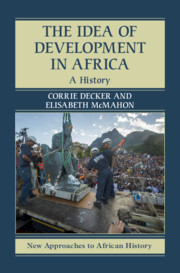Book contents
- The Idea of Development in Africa
- New Approaches to African History
- The Idea of Development in Africa
- Copyright page
- Contents
- Figures
- Tables
- Maps
- Boxes
- Acknowledgments
- Maps
- Introduction
- Part I Origins of the Development Episteme
- Part II Implementation of the Development Episteme
- Part III “Problems” in the Development Episteme
- Chapter 9 Reshaping Huts and Homes
- Chapter 10 Lessons in Separate Development
- Chapter 11 Capitalizing on Dis-ease
- Chapter 12 Manufacturing Modernization
- Epilogue
- Bibliography
- Index
- References
Chapter 12 - Manufacturing Modernization
from Part III - “Problems” in the Development Episteme
Published online by Cambridge University Press: 16 October 2020
- The Idea of Development in Africa
- New Approaches to African History
- The Idea of Development in Africa
- Copyright page
- Contents
- Figures
- Tables
- Maps
- Boxes
- Acknowledgments
- Maps
- Introduction
- Part I Origins of the Development Episteme
- Part II Implementation of the Development Episteme
- Part III “Problems” in the Development Episteme
- Chapter 9 Reshaping Huts and Homes
- Chapter 10 Lessons in Separate Development
- Chapter 11 Capitalizing on Dis-ease
- Chapter 12 Manufacturing Modernization
- Epilogue
- Bibliography
- Index
- References
Summary
European colonial trade with Africa set the stage for international interventions to “modernize” African economies. Since the 1880s colonial economists pressed for modernization and industrialization in Africa, but only to the extent that this aided the extraction of resources through the use of inexpensive African labor. Modernization thus had its limits in Africa, and only very rarely emerged out of partnerships with Africans. Large-scale, colonial industrial projects supplied cheap raw materials and managerial jobs for Europeans. Colonial governments and Western-owned companies industrialized the mining sectors of segregated states in southern Africa in order to generate profit for themselves, and not necessarily to aid the “modernization” of local economies. Even in postcolonial and postapartheid African states, industrialization has helped the few rather than the masses. Yet Africans have established their own projects for developing agriculture, mining, and manufacturing in order to improve their societies. Africans have taken the initiative to modernize their economies and form partnerships with governments and private funders on mutually beneficial terms. Despite the long history of Western dominance over discourses on economic modernization, African industrialization and economic development does not always (and does not have to) look like Western modernity.
Keywords
- Type
- Chapter
- Information
- The Idea of Development in AfricaA History, pp. 252 - 274Publisher: Cambridge University PressPrint publication year: 2020

